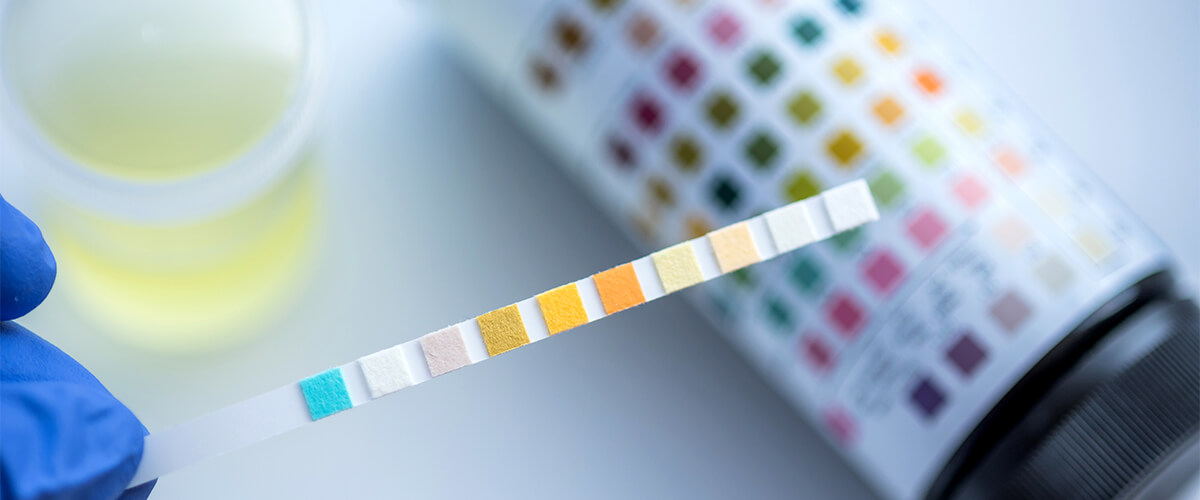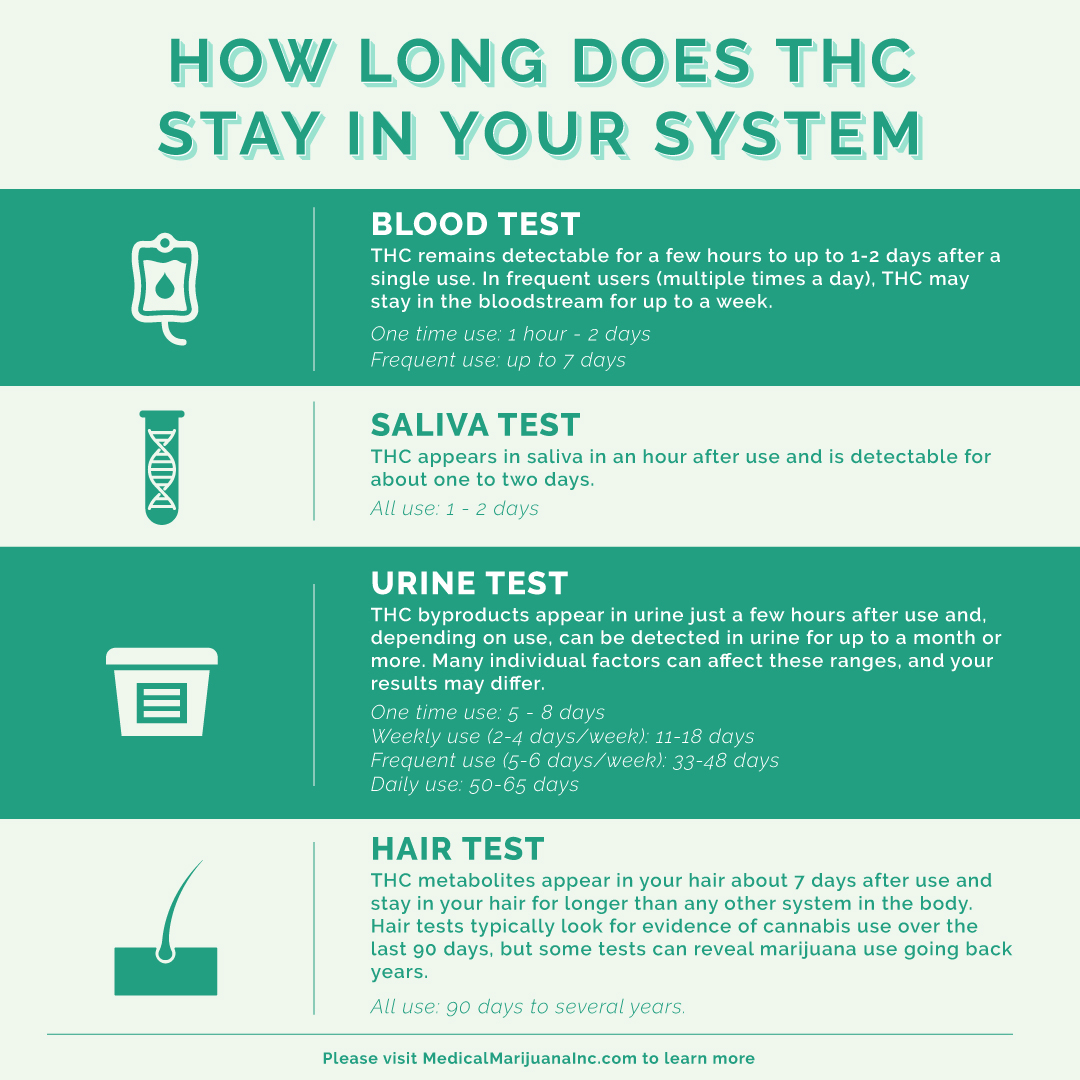THC is detectable for only a relatively short period, but how long does marijuana stay in your system? THC’s metabolites can stay around in the body for much longer than the duration of effects. In some cases, evidence of marijuana use can be detected for weeks, months, and even years, depending on the tests being used. In this article, we’ll explore exactly how long marijuana or “weed” can stay in your system and how long THC can be detected by drug tests.
While the euphoric effects of THC can fade rather quickly, lasting just a few hours when inhaled, the compound and its metabolites can stay in your system for weeks after consumption, in some cases even longer, putting you at risk to fail a drug test.
THC, or tetrahydrocannabinol, is the active compound found in marijuana – both medical and recreational – that causes short-term euphoric effects. Although these effects of THC last just a few hours, THC can stay in your system for much longer.
How Long Does THC Stay in Your System?
- How long does marijuana stay in blood? THC is rapidly metabolized by your body and only remains detectable in your blood for a few hours to 1-2 days after a single use. In heavy users (multiple times a day), THC may stay in the bloodstream for up to a week.
- How long does marijuana stay in saliva? THC appears in saliva an hour after use and remains detectable for up to one to two days.
- How long does marijuana stay in urine? THC byproducts remain for about 5-8 days after one time use, 11-18 days when cannabis is consumed 2-4 days per week, 33-48 days when consumed 5-6 days per week, and around 50-65 days if cannabis is consumed daily. Many individual factors can affect these ranges.
- How long does marijuana stay in hair? THC metabolites stay in your hair for longer than any other system in the body. Most hair tests look for evidence of cannabis use over the last 90 days, but some hair follicle tests reveal marijuana use going back years.
How THC Affects Your System
Why is THC detected in the body so long after use? It has much to do with the way the body absorbs and processes cannabinoids like THC. When you consume marijuana, the active compounds in marijuana are absorbed into the bloodstream, causing THC levels in the bloodstream to temporarily rise. Your blood carries THC to the brain and other organs throughout the body, where THC interacts with cannabinoid receptors to generate its effects on the body, including short-term euphoria.
THC stimulates neurons in the brain’s reward system to release the signaling chemical dopamine and elicit the pleasurable “high” associated with marijuana. Euphoric feelings associated with THC include an altered physical sense and perception of time, changes in mood, feelings of creativity and relaxation, and impaired body movement.
When marijuana is smoked, vaped, or dabbed, these short-term effects manifest within seconds and become fully apparent within a few minutes. Depending on your metabolism and the potency of the product consumed, these effects typically last for 1-3 hours.
When medical marijuana is ingested, like in the case of marijuana edibles, the onset of effects is delayed by digestion and takes hold in about 30 minutes to 2 hours after consumption. The duration of effects when THC is ingested in edibles is prolonged because of continued slow absorption.
THC itself is only detectable in the bloodstream for a short period. After a few hours, THC is rapidly broken down and modified into at least 80 different metabolic byproducts. While THC levels drop significantly after a few days, the use of cannabis and THC consumption can be detectable in the system for some time afterward.
THC and its metabolic byproducts, called metabolites, are lipid-soluble. This means they accumulate in fat reserves throughout the body and then are slowly released over time. Eventually, the metabolites are eliminated from the body through feces and urine. As such, the duration that marijuana stays in your system depends on the individual, their calorie intake, and how much marijuana that person consumes.

Factors That May Impact THC Metabolism
Each of us has a unique metabolism that processes THC at a different rate. Even among people of the same gender and age, individual lifestyle choices, body makeup, and cannabis consumption habits can influence how long THC stays in the system.
Some factors that can impact the rate of THC metabolism include:
- Eating habits
- Levels of exercise activity
- Metabolic rate
- Body fat content
- THC potency of cannabis
- Frequency of cannabis consumption
Because of these variables, it is nearly impossible to predict or know how long THC will remain detectable in a person with any kind of certainty.
THC and Drug Testing
Many people concerned about how long THC stays in their system are curious because they’re going to be subject to a drug test, perhaps at random at their place of employment, by a potential new employer, or as part of their athletic competition requirements. Even in states where marijuana is legal in some capacity, employers can and do restrict employees from using cannabis.
There are many different kinds of drug tests available, with each varying in levels of sensitivity and time periods to detect cannabis. An employer or athletic organization may use urine, hair, blood, saliva, breath, sweat, and even fingernails to investigate whether a person has recently consumed marijuana.
Urine analysis is by far the most common type of drug test used. The test can be conducted at your workplace using a test strip, or a sample may be sent away to a third-party laboratory for analysis. A urine test for marijuana does not look for THC. Rather, it’s able to detect the non-psychoactive metabolite 11-nor-delta9-caboxy-THC (THC-COOH).
Several factors can influence whether THC will be detectable in a drug test, including a person’s unique biology and patterns of cannabis usage, as well as the type and sensitivity of the test being used, making it difficult to define exact lengths of time THC is detectable.
“There is no typical window of detection,” says Ryan Vandrey, an associate professor of psychiatry and behavioral science at Johns Hopkins University told Leafly. “It is highly variable from person to person and it varies based on the frequency of use and the amount of use. So there is no way of predicting or knowing how long someone would test positive with any kind of certainty.”
This lack of a typical window of detection that can be applied to everyone makes the question of how long weed stays in your system tricky to answer. Whether THC will be detected in a drug test is highly variable from person to person, and it depends on the frequency and amount of marijuana use. In general, THC-COOH can linger in urine for days or weeks. In heavy users, THC could stay in your system for a month or more.

How Long THC is Detectable
Chances are, if you need to know how long weed stays in your system, there is a drug test on the horizon. There’s not one single answer to that question, because everyone’s body and dosage is different, but we’ll breakdown some of the most common scenarios where marijuana use is tested.
When considering how long the byproducts of THC stay in your system, however, it’s important to understand that it can depend on which system is being discussed.
How long does marijuana stay in blood?
In the bloodstream, THC is rapidly metabolized by your body and typically remains detectable for a few hours to 1-2 days after a single use. In daily consumers or among those who consume cannabis multiple times per day, THC may stay in the bloodstream for up to a week after the last session. Blood tests for marijuana use are rare and usually only done as a follow up to a potential false positive on a previous testing method.
How long does marijuana stay in saliva?
In the saliva, THC remains until it is swallowed fully, which typically takes about one to two days. Drinking water, brushing your teeth, eating fatty foods, and using mouthwash can help remove THC from saliva faster. Saliva tests are being explored as a potential way to check for marijuana use in drivers, though some cannabis advocates feel they aren’t reliable enough to test for impairment.
How long does marijuana stay in urine?
Urine tests for drugs are by far the most popular and frequently used, due to their ease of use and low cost. In the urine, byproducts of THC are detectable for a longer period of time, meaning they can reveal marijuana use for weeks after use. While the detectable window can vary, research suggests that in general THC byproducts remain for 5-8 days after one time use, 11-18 days when cannabis is consumed 2-4 days per week, 33-48 days when consumed 5-6 days per week, and around 50-65 days if cannabis is consumed daily.
How long does marijuana stay in hair?
THC metabolites stay in your hair for longer than any other system in the body. The standard for these hair follicle drug tests is 1.5 inches of hair, which shows three months of potential marijuana use. While most hair tests look for evidence of cannabis use over the last 90 days, some hair follicle tests can reveal marijuana use for up to a couple years, depending on the length of hair tested. These tests have been shown to be reliably accurate in detecting marijuana use, even on long periods of time.
Ways to Get THC Out of Your System
While there are some methods you can use to help manage the temporary euphoric effects of THC if you accidentally consume too much, speeding up the process of flushing out THC metabolites from your body’s systems can be difficult.
There are a couple of techniques that may help flush THC out of some of your systems.
For example, reducing calorie intake, exercising, and consuming high amounts of water may help flush THC from the body’s fat cells. Drinking water can also help reduce the concentration of THC metabolites in the urine.
The only method for ensuring that you’ll pass a drug test, however, is to abstain from medical marijuana consumption to make sure that THC isn’t in your system.
More on Medical Marijuana
You can learn more about medical marijuana, including information on how to obtain it legally or grow cannabis on your own at home, by visiting our Cannabis 101 page. Keep up with the cannabis-related legislative and industry developments through our news page.
[Read More ...]
Originally posted on How Long Does THC Stay in Your System? via Vic Neufeld Medical Marijuana News

No comments:
Post a Comment